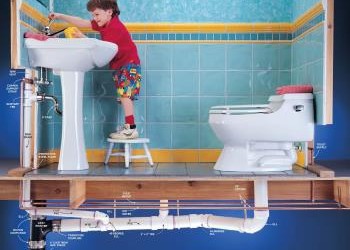Essential Bathroom Plumbing Advice for Beginners
Essential Bathroom Plumbing Advice for Beginners
Blog Article
What're your thoughts on Smart Plumbing Tips for New Homeowners?

For brand-new house owners, understanding and maintaining washroom pipes can save both time and money by protecting against pricey problems down the line. Here are some essential washroom plumbing suggestions to help you maintain everything running efficiently.
Get Ready For Winter
Secure your pipes from cold during winter by protecting pipelines in unheated areas like cellars, attics, and garages. During severe cold, allow cold water drip from faucets offered by exposed pipelines to assist prevent cold.
Schedule Routine Upkeep
Think about organizing annual assessments with a certified plumber. They can spot problems that you could miss, such as hidden leakages or wear and tear on pipelines and fixtures. Routine upkeep helps prolong the life of your plumbing system and can stop emergencies.
Familiarize Yourself with the Key Shut-Off Valve
Understanding where the major water shut-off valve lies in your home is vital. This allows you to rapidly switch off the water supply in case of significant leakages or during plumbing emergencies, protecting against extensive water damage.
Consistently Examine for Leakages
Tiny leaks can result in huge troubles. Regularly inspect under sinks, around commodes, and near plumbing fixtures for any indications of leakages. Seek dampness, small drips, or corrosion. Capturing and fixing leakages early can prevent much more major damages and conserve water.
Keep Your Water Heater
Ensure your water heater is set to a suitable temperature (normally about 120 levels Fahrenheit) to prevent scalding and reduce energy usage. Flush the tank annually to eliminate sediment accumulation, which can minimize the effectiveness and life expectancy of your heating unit.
Update Your Fixtures
If your home has older components, take into consideration upgrading to more efficient models. Modern toilets, showerheads, and taps are developed to utilize less water while providing good pressure, which can significantly lower your water costs and environmental impact.
Beware with Do It Yourself Pipes Repair Works
While it's alluring to manage all home repair services by yourself, beware with plumbing. Some issues might call for specialist know-how, specifically if they entail primary water lines or sewer repairs. Working with an expert can in some cases be much more affordable than DIY, especially if it protects against more damage.
Do Not Neglect Slow Drains Pipes
If your sink or tub is draining gradually, it's commonly an indication of a clog creating. Addressing this very early can avoid a complete clog. Utilize a plunger or a plumber's serpent to remove debris. Stay clear of utilizing chemical drain cleansers as they can damage your pipelines over time.
Know What Not to Flush
Commodes are not waste disposal unit. Avoid purging anything aside from toilet tissue and human waste. Items like wipes, womanly hygiene items, and cotton swabs need to be taken care of in the trash to stop blockages and sewage system back-ups.
Install Strainers in Drains
Area strainers in your sink and tub drains pipes to catch hair and various other debris prior to they enter your plumbing system. Cleaning up the filters frequently will aid avoid build-up and keep water moving freely.
Verdict
Understanding and preserving your home's washroom plumbing can stop numerous typical issues. By complying with these crucial suggestions, you can ensure your washroom remains useful and efficient, saving you time and money in the future.
Essential Plumbing Tips for Homeowners: Keep Your Pipes Flowing Smoothly
As a homeowner, understanding the basics of your plumbing system can save you time, money, and a lot of headaches. Plumbing issues can range from minor annoyances like dripping faucets to major problems like burst pipes that cause significant damage. This guide provides essential tips to help you maintain your plumbing system and tackle common issues.
Understanding Your Plumbing System
Supply System: Brings fresh water into your home from a municipal source or a well. Drain-Waste-Vent System: Removes wastewater and vents sewer gases outside. Fixtures and Appliances: Includes sinks, toilets, showers, dishwashers, and washing machines. Basic Maintenance Tips
Regular Inspections: Periodically check for leaks, corrosion, and other signs of wear and tear. Look under sinks, around toilets, and near water heaters. Know Your Main Shut-Off Valve: In case of a major leak, you’ll need to shut off the water quickly. Ensure everyone in your household knows where the main shut-off valve is located. Prevent Frozen Pipes: In cold climates, insulate exposed pipes and let faucets drip during extreme cold to prevent freezing. Use Strainers: Install strainers in sinks and tubs to catch hair, food particles, and other debris that can cause clogs. Common Plumbing Issues and Solutions
Clogged Drains:
Prevention: Avoid pouring grease down the drain and use drain screens to catch debris. DIY Fix: Use a plunger or a plumbing snake to clear minor clogs. For stubborn clogs, a mixture of baking soda and vinegar can sometimes help. Leaky Faucets:
Prevention: Replace washers and seals regularly. DIY Fix: Turn off the water supply, disassemble the faucet, and replace worn parts.

Visit The Following Page Report this page